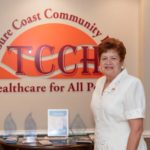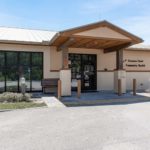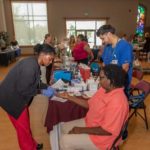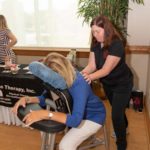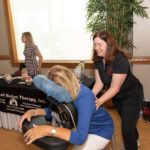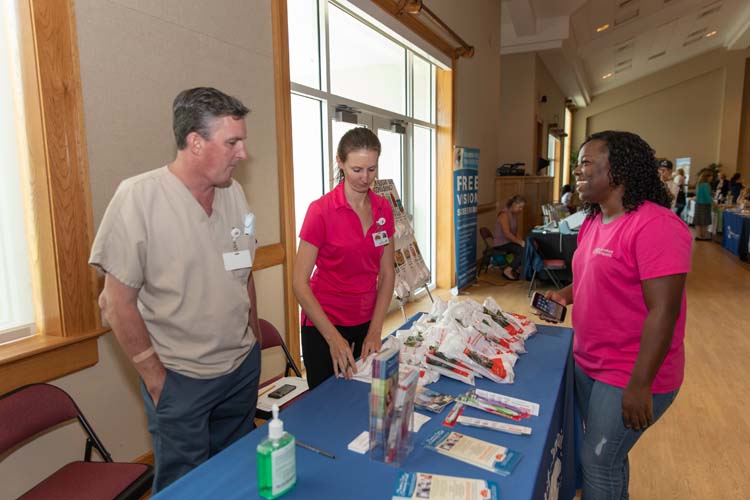
First Presbyterian Church of Vero Beach was abuzz with healthy chatter last Wednesday at a Health Fair hosted by Treasure Coast Community Health to raise awareness of its care centers and to commemorate National Health Care Week.
Attendees could visit with 36 of TCCH’s health-related community partners, whose numerous services run the gamut from in-home and assisted living senior care to rehab and chiropractic services.
“It’s kind of a one-stop shop,” says Colette Heid, TCCH communications director. “We provide primary medical, dental and behavioral healthcare. A lot of the ancillary services need to be referred out. This is a great way for people to find out what services are available in the community.”
The nonprofit health organization earned its silver stripes this year, having spent the past 25 years helping Indian River County residents to live healthy, productive lives by eliminating barriers to healthcare, no matter their socioeconomic status.
TCCH developed out of the Fellsmere Community Health Coalition, a small clinic established in 1993 by a volunteer doctor and nurse to provide medical care to under- and uninsured workers during the migrant season. They soon realized the need was greater than they could handle alone.
Two years later, with the support of the U.S. Department of Health, Fellsmere community leaders, Indian River Medical Center and Sebastian River Medical Center, the clinic became the Fellsmere Medical Center. Through grants, the nonprofit was able to make improvements to the building and increased services to include dental and eventually behavioral health counseling.
After hurricanes Frances and Jeanne hit in 2004, they saw a substantial increase in clients needing their services, including many patients coming in from all over the county. As a result, the board decided to open a south county location on Oslo Road and changed the organization’s name to Treasure Coast Community Health.
TCCH is the only Federally Qualified Health Center (also known as a Community Health Center) in the county, according to TCCH CEO Vicki Soulé. FQHCs serve all patients, including low-income, homeless, under- and uninsured, immigrants, migrants and seasonal farm workers, with payments on a sliding scale based on an ability to pay.
Additionally, the government requires the majority of board members to also be consumers of the services themselves.
“Not in a light way like getting a flu shot but really seeing doctors, dentists and behavioral health specialists for the majority of their primary care services,” Soulé explains.
While the Oslo facility was under construction, a temporary clinic was set up in central Vero Beach, and within 18 months the number of patients there quadrupled.
“That clearly demonstrated there was a need in this part of the county and they were doing the right thing,” says Soulé.
The nonprofit has continued to expand and currently operates out of six locations; each developed in response to a growing need within the community: two in Fellsmere, one in Sebastian and in Vero Beach, two medical offices and one dental office. They also plan to add an optional service, particularly for patients with chronic conditions, connecting them with RNs to act as health coaches and advocates.
In the 10 years Soulé has been with TCCH, the number of unduplicated patients has more than doubled from 8,000 to more than 19,500 individuals.
“They come because our caregivers do a great job with them,” she says.
The TCCH client base has also changed from the generationally poor – individuals who were either not taught to take good care of themselves or who never had the financial wherewithal to do so – to those who may have lost their job as a result of the recession or who cannot afford medical insurance or care and have needed to seek alternative health care options.
“The general population is using our services,” says Dennis Bartholomew, TCCH director of business development. “There certainly still is that core group that has always come to us, who are the people in need and can’t afford to go anywhere else. But as we’ve grown over the years, we’re seeing people who are working in the community but, because of the cost of insurance and medical care, they need our help.”
“Our costs are escalating in the United States, versus the outcomes when you compare it to other nations,” says Soulé. “This is a model that has worked for almost 55 years as a community health service under the Bureau of Public Health, and it’s adaptable enough that it works whether you’re in an urban area or a rural area, whether you have a lot of patients or a few patients.”
The reason, she says, is the flexibility of having a local governing board that can give feedback as to what they identify as local needs versus resources.
A recent relocation of the TCCH administrative offices to a building on Indian River Boulevard has opened the doors to more collaboration with other related nonprofits. TCCH shares the second floor of the building with the Healthy Start Coalition, the Kindergarten Readiness Collaborative and Tykes & Teens.
“We serve about 7,500 kids, so that’s a very dynamic part of our business. We’re all very engaged, as is this whole community,” says Soulé. “We meet once a month and talk about things that we could do together to support each other and to better help our patients.”
For example, Kindergarten Readiness received a donation of 7,000 books for their One Book One Read program and TCCH will distribute 2,000 of them through their pediatricians to mothers, encouraging them to read to their children.
TCCH offers comprehensive primary care, including medical, dental and behavioral health services.
“There are no requirements. You just walk on in. We accept all kinds of insurance. And for people who do not have insurance, we ask that they bring their financial documents. We have a sliding fee scale discount program,” says Soulé, noting that discounts, based on family size and income, are in accordance with federal poverty guidelines.
“We’re not the Cadillac of charges. We aim to be the Cadillac of quality,” says Soulé. Through services such as cancer screenings, diet modification, blood pressure and diabetes monitoring, she says, they try to keep patients’ health on track.
“The reality is we have them before us for a very short time, so it has to be something the patient engages in and says, ‘Yeah I want to try this and if it doesn’t work, I’m willing to come back and we’ll figure out something else.’ We want to keep them whole and healthy,” says Soulé.
They also offer prescription assistance, translation services, social service referrals for food and housing, Medicaid eligibility/enrollment and assistance understanding the Federal Health Insurance Marketplace.
Because they do not refuse patients for an inability to pay, TCCH relies on local donations to supplement costs. Donors can donate to a general fund or can specify a specific area of care.
“Philanthropy is important because we need some stability for those individuals who come to us without insurance,” says Soulé. Despite pockets of great wealth, much of Indian River County is considered a low-income, medically underserved area.
“We’re a Federally Qualified Health Center, which covers about 18 percent of the budget. Insurance covers a bunch, but there’s always the missing piece of the puzzle,” explains Bartholomew.
People can also contribute through fundraisers such as road rallies, golf tournaments and their upcoming Duck Derby, which takes place Oct. 14 at Capt. Hiram’s Sandbar.
“I want to sell one duck to everybody in Vero Beach. It’s just $5,” says Bartholomew.
For more information, visit tcchinc.org.
Photos by: Denise Ritchie
Click HERE to see more or buy photos
- Vicki Soulé
- Dr. Juliette Valeriano
- Dr Juliette Valeriano and medical assistant Altansas Gordon
- TCCH clinic at 1545 9th Street SW (Oslo Road)
- TCCH first clinic at 12196 CR 512 in Fellsmere
- Emily Thompson, Colette Heid and Dr. Sandra Wechsler
- Tanya Jones, Jonnie Mae Perry (sitting), and Edgar Ortiz
- Amy Lloyd gives a chair massage at the TCCH Health Fair
- Vontrell Lee-Kin from Renaissance Senior Living talks with Charlotte and Philip Topliff
- Mary Carter and Scott Duncan
- Tadd Richards, Kara Seng and Danielle Johnson
- Amy Lloyd gives a chair massage at the TCCH Health Fair
- TCCH Health Fair
- TCCH Health Fair
- TCCH Health Fair
- TCCH Health Fair

